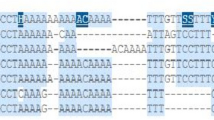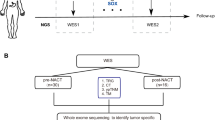Abstract
Purpose
The present study analyzed the polymorphisms of apoptosis-related genes and their impact on the response to chemotherapy and survival of patients with advanced gastric cancer.
Patients and methods
Fifty-seven patients with advanced gastric cancer treated with paclitaxel and cisplatin combination chemotherapy were enrolled in the present study. The genomic DNA was extracted from paraffin-embedded tissue, and the single nucleotide polymorphisms (SNPs) of ten apoptosis-related genes [LTA, TP53, BCL2L11, BID, FASL, caspase 3, caspase 6, caspase 7, and caspase 9] determined using a polymerase chain reaction–restriction fragment length polymorphism assay.
Results
The Arg/Pro and Pro/Pro genotypes of TP53 codon 72 were significantly correlated with a lower response rate to the combination chemotherapy when compared to the Arg/Arg genotype (35.7 vs. 66.7%, P-value 0.019) in a logistic regression analysis. A multivariate survival analysis also showed that the time to progression for the patients with the Arg/Pro and Pro/Pro genotypes of TP53 codon 72 was worse than for the patients with the Arg/Arg genotype (Hazard ratio = 3.056, P-value = 0.047), whereas the overall survival was not significantly different.
Conclusion
The TP53 codon 72 SNP was found to be predictive of the response to chemotherapy and correlate with the time to progression in patients with advanced gastric cancer treated with paclitaxel and cisplatin chemotherapy.


Similar content being viewed by others
References
Murad AM, Santiago FF, Petroianu A, Rocha PR, Rodrigues MA, Ransch M (1993) Modified therapy with 5-fluorouracil, doxorubicin, and methotrexate in advanced gastric cancer. Cancer 72:37–41
Pyrhonen S, Kuitunen T, Kouri M (1995) A randomized, phase III trial comparing fluorouracil, epidoxorubicin and methotrexate (FEMTX) with best supportive care in non-resectable gastric cancer. Br J Cancer 71:587–591
Glimelius B, Hoffmann K, Haglund U, Nyron O, Sjoden PO (1994) Initial or delayed chemotherapy with best supportive in advanced gastric cancer. Ann Oncol 5:189–190
Kim NK, Park YS, Heo DS, Suh C, Kim SY, Park KC, Kang YK, Shin DB, Kim HT, Kim HJ, Kang WK, Suh CI, Bang YJ (1993) A phase III randomized study of 5-fluorouracil and cisplatin versus 5-fluorouracil, doxorubicin, and mitomycin C versus 5-fluorouracil alone in the treatment of advanced gastric cancer. Cancer 71:3813–3818
Vanhoefer U, Wagner T, Lutz M, Van Cutsem E, Nordlinger B, Reuse S, Baron B, Wilke H, Wils J (2001) Randomized phase II study of weekly 24-h infusion of high dose 5-FU ± folinic acid (HD-FU ± FA) versus HD-FU/FA/biweekly cisplatin in advanced gastric cancer. EORTC-trial 40953. Eur J Cancer 37:27
Roth AD, Maibach R, Martinelli G, Fazio N, Aapro MS, Pagani O, Morant R, Borner MM, Hermann R, Honegger H, Cavalli F, Alberto P, Castighine M, Goldhirsch A (2000) Docetaxel (taxotere)-cisplatin (TC): an effective drug combination in gastric carcinoma. Ann Oncol 11:301–306
Boku N, Ohtsu A, Shimada Y, Shirao K, Seki S, Saito H, Sakata Y, Hyodo I (1999) Phase II study of a combination of irinotecan and cisplatin against metastatic gastric cancer. J Clin Oncol 17:319–323
Ajani JA, Fairweather J, Dumas P, Patt YZ, Pazdur R, Mansfield PF (1998) Phase II study of taxol in patients with advanced gastric carcinoma. Cancer J Sci Am 4:269–274
Bokemeyer C, Lampe CS, Clemens MR, Hartmann JT, Quietzsch D, Forkmann L, Kollmannsberger C, Kanz L (1997) A phase II trial of paclitaxel and weekly 24 h infusion of 5-fluorouracil/folinic acid in patients with advanced gastric cancer. Anticancer Drugs 8:396–399
Kollmannsberger C, Quietzsch D, Haag C, Lingenfelser T, Schroeder M, Hartmann JT, Baronius W, Hempd V, Uemens M, Kanz L, Bokemeyer C (2000) A phase II study of paclitaxel, weekly, 24-hour continuous infusion 5-fluorouracil, folinic acid and cisplatin in patients with advanced gastric cancer. Br J Cancer 83:458–462
Kim MK, Lee KH, Hyun MS, Do YR, Song HS, Lee WS, Park KU, Baek JH, Kim JG (2005) A multi-center, phase II clinical trial of Padexol (paclitaxel) and cisplatin for patients suffering with advanced gastric cancer. Cancer Res Treat 37:349–353
Kim JG, Sohn SK, Song HS, Kwon KY, Do YR, Lee KH, Hyun MS, Ryoo HM, Bae SH, Park KU, Baek JH, Lee WS, Chung JS, Cho GJ, Sohn CH, Jang JS, Chung HY, Yu W (2007) Multicenter phase II study of weekly paclitaxel plus cisplatin combination chemotherapy in patients with advanced gastric cancer. Cancer Chemother Pharmacol 60:863–869
Ellis PA, Smith IE, McCarthy K, Detre S, Salter J, Dowsett M (1997) Preoperative chemotherapy induces apoptosis in early breast cancer. Lancet 349:849
Kerr JF, Winterford CM, Harmon BV (1994) Apoptosis. Its significance in cancer and cancer therapy. Cancer 73:2013–2026
Thomas M, Kalita A, Labrecque S, Pim D, Bank L, Matlashewski G (1999) Two polymorphic variants of wild-type p53 differ biochemically and biologically. Mol Cell Biol 19:1092–1100
Dumont P, Leu JL, Della Pietra AC III, George DL, Murphy M (2003) The codon 72 polymorphic variants of p53 have markedly different apoptosis potential. Nat Genet 33:357–365
Rajaraman P, Wang SS, Rothman N, Brown MM, Black PM, Fine HA, Loeffler JS, Selker RG, Shapiro WR, Chanock SJ, Inskip PD (2007) polymorphisms in apoptosis and cell cycle control genes and risk of brain tumors in adults. Cancer Epidemiol Biomarkers Prev 16:1655–1661
Xu Y, Yao L, Ouyang T, Li J, Wang T, Fan Z, Lin B, Lu Y, Xie Y (2005) p53 Codon 72 polymorphism predicts the pathologic response to neoadjuvant chemotherapy in patients with breast cancer. Clin Cancer Res 11:7328–7333
Ohmiya N, Taguchi A, Mabuchi N, Itoh A, Hirooka Y, Niwa Y, Goto H (2006) MDM2 promoter polymorphism is associated with both an increased susceptibility to gastric carcinoma and poor prognosis. J Clin Oncol 24:4434–4440
Zhang ZW, Laurence NJ, Hollowood A, Newcomb P, Moorghen M, Gupta J, Feakins R, Farthing MJG, Alderson D, Holly J (2004) Prognostic value of TP53 codon 72 polymorphism in advanced gastric adenocarcinoma. Clin Cancer Res 10:131–135
Wang YC, Lee HS, Chen SK, Chang YY, Chen CY (1999) Prognostic significance of p53 codon 72 polymorphism in lung carcinoma. Eur J Cancer 35:226–230
Therasse P, Arbuck SG, Eisenhauer EA, Wanders J, Kaplan JS, Rubinstein L, Verweij J, Van Glabbeke M, Van Qosterom AT, Christian MC, Gwyther SG (2000) New guidelines to evaluate the response to treatment in solid tumors. European Organization for Research and Treatment of Cancer, National Cancer Institute of the United States, National Cancer Institute of Canada. J Natl Cancer Inst 92:205–216
Pim D, Banks L (2004) p53 Polymorphic variants at codon 72 exert different effects on cell cycle progression. Int J Cancer 108:196–199
Sullivan A, Syed N, Gasco M, Bergamaschi D, Trigiante G, Attard M, Hiller L, Farrell PJ, Smith P, Lu X, Crook T (2004) Polymorphism in wild-type p53 modulates response to chemotherapy in vitro and in vivo. Oncogene 23:3328–3337
Toyama T, Zhang Z, Nishio M, Hamaguchi M, Kondo N, Iwase H, Iwata H, Takahashi S, Yamashita H, Fujii Y (2007) Association of TP53 codon 72 polymorphism and the outcome of adjuvant therapy in breast cancer patients. Breast Cancer Res 9:R34
Wang Y, Kringen P, Kristensen GB, Holm R, Baekelandt MMO, Oliver M, Skomedal H, Hainaut P, Trope CG, Abeler VM, Nesland JM, Borresen-Dale AL, Helland A (2004) Effect of the codon 72 polymorphism (c.215G > C, p.Arg72Pro) in combination with somatic sequence variants in the TP53 gene on survival in patients with advance ovarian carcinoma. Hum Mutat 24:21–34
Santos AM, Sousa H, Portela C, Pereira D, Pinto D, Catarino R, Rodrigues C, Araujo AP, Lopes C, Medeiros R (2006) TP53 and P21 polymorphisms: response to cisplatinum/paclitaxel-based chemotherapy in ovarian cancer. Biochem Biophys Res Commun 340:256–262
Author information
Authors and Affiliations
Corresponding author
Rights and permissions
About this article
Cite this article
Kim, J.G., Sohn, S.K., Chae, Y.S. et al. TP53 codon 72 polymorphism associated with prognosis in patients with advanced gastric cancer treated with paclitaxel and cisplatin. Cancer Chemother Pharmacol 64, 355–360 (2009). https://doi.org/10.1007/s00280-008-0879-3
Received:
Accepted:
Published:
Issue Date:
DOI: https://doi.org/10.1007/s00280-008-0879-3




